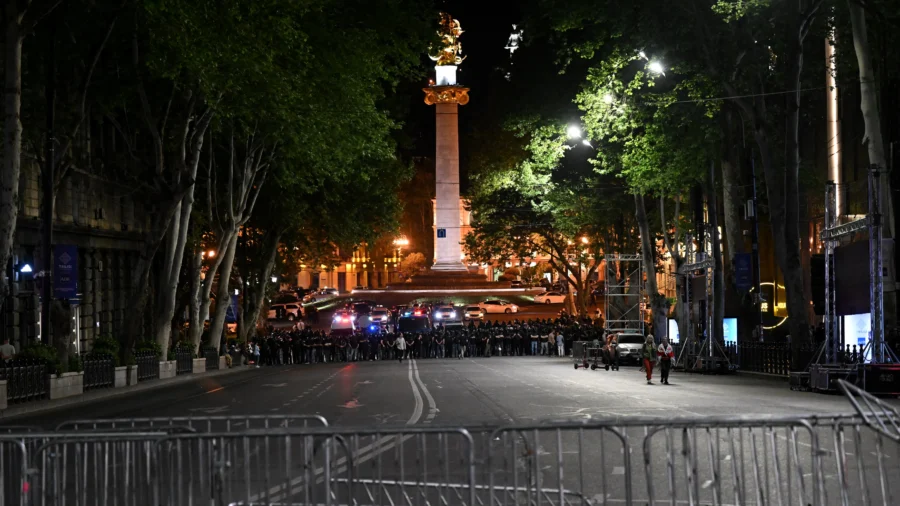Georgia is experiencing a wave of mass protests over controversial proposed legislation in the country. Located where the European and Asian continents meet, the former Soviet republic’s ruling “Georgian Dream Party” reintroduced plans in mid-April to pass a “foreign influence law,” French news outlet AFP reported.
Critics say the proposed law closely resembles Russian legislation used to silence dissenters, with some protesters referring to the rule as “the Russian Law.” It states that any independent NGO or media organization receiving more than 20 percent of its funding from abroad will be registered as an “organization pursuing the interests of a foreign power.”
A similar measure previously introduced by the Georgian government was also met with protests, which forced the government to scrap the proposal in 2023. Protests last year’s saw police use tear gas and water cannon to disperse demonstrators.
Organizers of the protest staged what they called a “March for Europe” in the capital Tbilisi’s First Republic Square on April 28. The protest was attended by an estimated 20,000 people, some of which clashed with police during the rallies.
The demonstrators engaged in a more than half-a-mile-long procession along Tbilisi’s main thoroughfare toward parliament. The protests were led by a large European Union flag, with some protesters stressing their wish to conform to more broadly European norms of governance.
“I am here to protect Georgia’s European future,” said 19-year-old Lasha Chkheidze. “No to Russia. No to the ‘Russian law.’ Yes to Europe.”
Around 100 activist groups and opposition parties were responsible for organizing the protests. The organizers largely kept a low profile during the rallies. According to a statement issued by the organizers, however, the proposed legislation is a clear indication of government overreach.
“The authorities, which have reintroduced the Russian bill, are going beyond the constitutional framework and changing the country’s orientation, betraying the unwavering will of the people,” the organizers said.
According to eyewitness accounts, some protesters attempted to erect an EU flag outside the parliament building, but were met with police using pepper spray as the protesters attempted to break through the police cordon, verbally confronting police.
The protest then turned violent, with demonstrators engaging in physical altercations with law enforcement, which led to hundreds of riot police being deployed just after midnight, according to a statement by Georgia’s interior ministry.
On April 29, Georgia’s ruling party announced its own rally in response to the protests. A second reading of the proposed bill by a parliamentary committee is set to take place later on Monday.
Georgian President Salome Zourabichvili, who stands in opposition to the Dream party, has vowed to veto the law. The veto, however, is likely to be voted down due to the Georgian Dream Party’s commanding majority in the legislature—which means it does not require support from opposition MPs to override the veto.
Opinion polls show that more than 80 percent of Georgia’s population is in support of EU and NATO membership, which is also backed by the country’s constitution.
Georgian Dream, meanwhile, has asserted its support for Europe and brushed off allegations against the proposed law, saying it only serves as a means to “boost transparency” of the foreign funding sources of NGOs. Critics, however, say the law deepens ties with Russia.
“This law, as well as this government, are incompatible with Georgia’s historic choice to be an EU member,” the leader of the opposition Akhali party, Nika Gvaramia, told AFP at the protest.
European Council President Charles Michel has said the bill is inconsistent with the country’s bid for EU membership, saying it would push Georgia further away from the EU rather than bringing it closer.
Georgia, which was once viewed as spearheading the democratic transformation of former Soviet-ruled countries, was granted official EU candidate status in December, 2023. At the same time, however, the country has received criticism in recent years for what is perceived by some as a move away from democratic rule.
Consequently, Brussels set certain stipulations before considering Georgia’s EU membership, including judicial and electoral reform in the country, as well as the diminished influence of oligarchs.
Protests reportedly also occurred in other cities, including Georgia’s second-largest city of Batumi.
Meanwhile, there have also been voices of concern in Washington expressing concern over Georgia’s political trajectory toward Russia and Russian-style legislational changes.
The proposed foreign influence bill will need to pass second and third readings in parliament—in addition to overcoming the presidential veto—in order to be signed into law.


